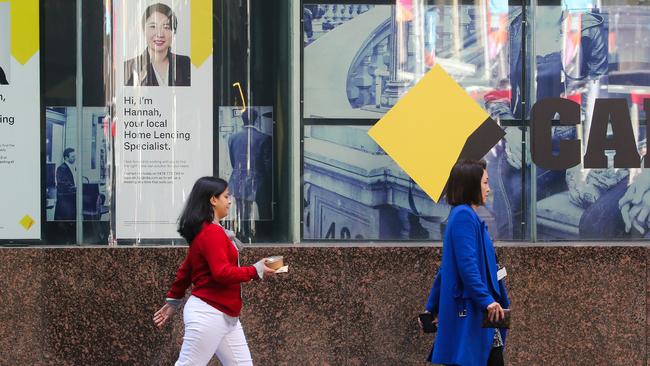ASX reporting season expected to show consumer resilience in the face of cost-of-living pressures
Australians are doing it tough but they’re a resilient bunch, the results of big consumer businesses are expected to show when they report this week.

Australia’s leading consumer businesses are set to reveal surprising resilience in household spending, amid cost-of-living pressures and delays to expected interest rate relief from the Reserve Bank.
Market strategists say recent trading updates have shown greater resilience than previously assumed from Australian households, which have faced the highest levels of inflation in more than three decades.
This week will be the second busiest period of earnings results in, with major consumer-facing stocks JB Hi-Fi, Temple & Webster, Telstra and Car Group (owner of Carsales) scheduled to report, while Commonwealth Bank will lift the lid on how mortgage holders are withstanding the highest interest rates in 12 years.
The consensus analyst prediction is for overall corporate earnings to fall again this year as companies continue to come off the high profit base they set during the Covid-19 years through a combination of supply and demand forces.
UBS forecasts that earnings by companies on the S&P/ASX 200 for the 2024 financial year will decline by 3.5 per cent.
UBS strategist Richard Schellbach said company results in August would show evidence Australians were more resilient in their spending patterns as higher job security and rising asset prices countered cost of living pressures.
UBS’s consumer survey for the June quarter shows that Australians are prepared to spend money despite cost of living pressures.
“The resilience of the Aussie consumer to higher rates has been a standout over the last two years. Overspending through the Covid years was supposed to end in a pullback, but this has not happened. The detachment from long run trends seems to suggest something structural is going on, as Australian households transition to becoming increasingly ‘asset wealth’-driven,” he said.

Commonwealth Bank is expected to book a modest fall in annual earnings per share of 1.7 per cent to $5.79, and net income of $12.17bn, down 3.7 per cent, in its results on Wednesday, according analysts surveyed by Bloomberg.
Markets expect JB Hi-Fi on Monday to report a fall of around 1 per cent in annual group revenue to $9.52bn, on the back of lower sales and 160 basis points worth of margin compression, as the retailer funded in-store discounting.
Meanwhile, Telstra has offered some clues as it how consumers are responding to its price rises, predicting a 2.1 per cent increase in revenue to $23.66bn for the fiscal year. The telco’s results are due on Thursday.
Wilsons Advisory equity strategist Greg Burke said in a note to clients that the 2024 financial year was on track to be the second consecutive financial year of below average growth.
“While the consumer environment remains somewhat subdued amid cost-of-living pressures and delays to expected interest rate relief from the RBA, recent trading updates have shown a surprising level of resilience from Australian households,” Mr Burke said.
“This has likely been driven to an extent by a boost to confidence and a subsequent ‘pull forward’ of spending in advance of (now effective) tax cuts.”
Mr Burke said Commonwealth Bank – the only major bank to report annual results this month – now had a valuation premium more than double its competitors on a price-to-book ratio, with recent momentum suggesting its share price, which is up 14 per cent since January, was disconnected from its benign fundamentals.
Wilsons Advisory expected CBA’s results to show deteriorating asset quality, with bad debts likely to follow arrears higher, but off a low base, stable net interest margins and a cautious outlook, given uncertainty in the economy and delays to expected RBA rate cuts into 2025.
UBS noted cost-of-living pressures remained, but Australian consumers were managing by becoming more discerning and trading down in private label food, cheaper apparel and general merchandise and fewer big ticket purchases.
It expects that aggregate retail sales growth has been resilient and said trends suggested the big winners from the pivot by consumers would be companies with exposure to older and younger consumers (teens, non-renters), affluent consumers, and beneficiaries of trading down, such as Kmart.

IG market analyst Tony Sycamore said he was not convinced that consumers were as resilient as stated, with higher sales figures being masked by record levels of migration, which saw 547,300 net arrivals in 2023.
“The levels of immigration have been very strong, and that has helped spending,” he said. “The fact is consumers are only perking up around seasonal times when there are sales. If you take out that population growth from many of the metrics used here in Australia it is not as rosy and healthy.”
Mr Sycamore said that cost-of-living pressures would affect companies, and given the Reserve Bank was talking about interest rates remaining higher for longer, this would delay household recovery.
He added that businesses are increasingly resorting to more frequent sales, which he expected would continue.
“When consumers are treated to sales they expect them more often. It’s like a block of chocolate, you’re not going to want to give it up. You’re training consumers to wait for those opportunities by having frequent sales,” he said.
“The need to reduce the price of goods, from electronics to airline tickets, to get consumers’ interests will flow through into profits at Qantas, your Flight Centres, Harvey Normans and JB Hi-Fi. It will be a tough second half of the year for retail, and they’re going to need to wait for Black Friday to see any bounce.”
Australian Bureau of Statistics figures show that retail trade has increased 2.2 per cent in the past year, with $36.11bn spent in June. This compares to population growth of 2.5 per cent.




To join the conversation, please log in. Don't have an account? Register
Join the conversation, you are commenting as Logout